These days, most dramatic things or big decisions that happen in life tend to be called "journeys". That's ruined a great word. In 2020, many of us have taken unexpected "journeys". Nearly all of us have faced unexpected challenges. By a bizarre twist, I've managed to mix the business disaster of COVID, with the biggest health challenge of my life. I'm lucky to be alive. And as you'd expect of a brush with mortality, it's changed me.
2020 was already shaping up as a year of challenges and lessons as I headed to Sydney's Neilsen Park for my daily swim on 4 May. Things were looking grim for our businesses in Vietnam. I was stranded in Sydney and The Old Compass Cafe and Old Compass Travel walking tours were both on ice. Traffic to rusty compass.com was collapsing as travellers cancelled trips to Vietnam and Cambodia.
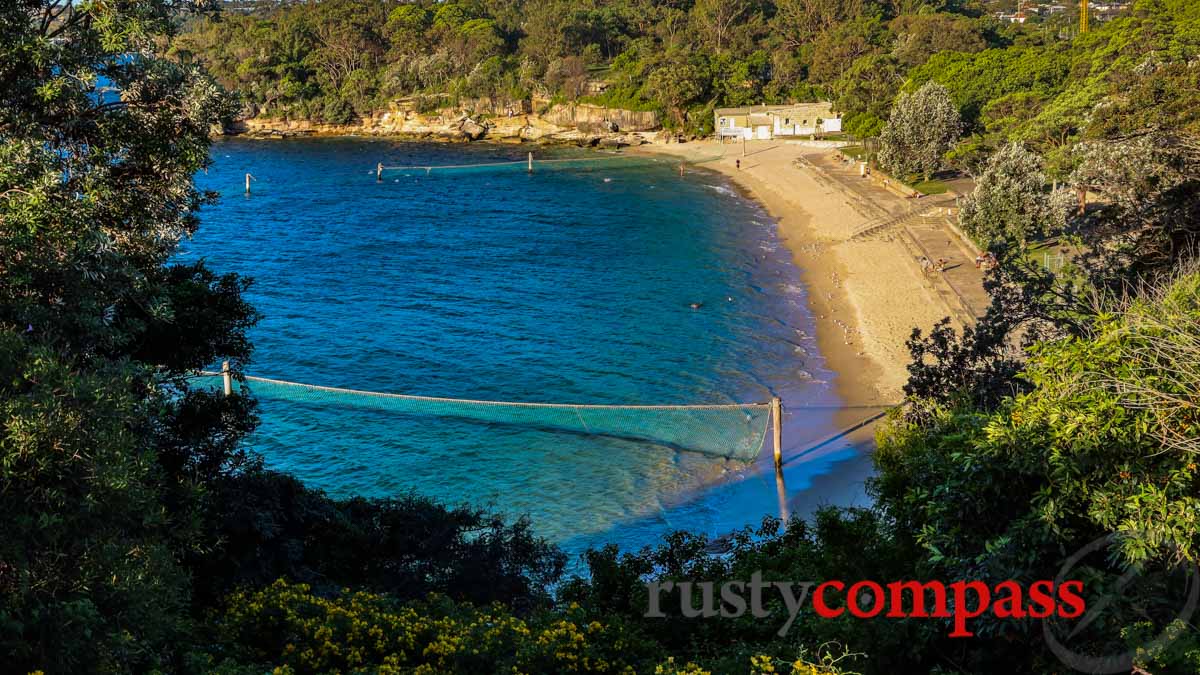
Photo: Mark Bowyer Neilsen Park Sydney Harbour - my COVID refuge before disaster struck.
It seemed I had neatly targeted businesses least likely to survive a pandemic. Still, my spirits were high. Like many people, the lockdowns provided a surprising opportunity to reflect, read and reevaluate. I was healthy, eating well, staying fit and lucky to have my house in Sydney's inner west available. I love the house and the area. Daily swims in the harbour were a special blessing. Knowing what was happening around the world, I knew things in my world were pretty good.
Then my big Monday in May came around. After the swim I headed home and had dinner. Soon after dinner I started to feel pains in my stomach and back. It was uncomfortable but not too bad. I waited for 8 hours hoping things would improve. They didn't. They got progressively worse. By 4am, I decided it was time to head up to hospital. Luckily, Royal Prince Alfred Hospital aka. RPA, is only 5 minutes away, or I may have postponed hospital by a few more hours and I probably wouldn't have survived. The Emergency Room was eerily quiet on account of COVID. I saw a doctor quickly and had a CT scan. I had no sense that this was especially serious. By 6AM, an aortic dissection had been diagnosed. I had no idea what that was. But the doctor told me I needed lifesaving emergency surgery that would start in a few hours. I'd need to make some phone calls.
Looking back, it's hard to believe that 12 hours earlier I was feeling great and getting out of the water at Neilsen Park.
Surgery lasted 10 hours. I'm told there were several occasions when doctors believed I wouldn't survive. In the days that followed I had a stroke that paralysed my left side, and I contracted pneumonia. I spent 16 days in Intensive Care, most of it sedated, twice intubated. Those weeks are still a blur. When they ended, I had to learn to walk and eat again. My stroke resolved itself quickly - I regained normal function on my left side after a few days. But I was shocked to discover how quickly an unused body degrades. Walking a few steps was terrifying and a huge challenge. It takes months to build strength. Days to lose it.
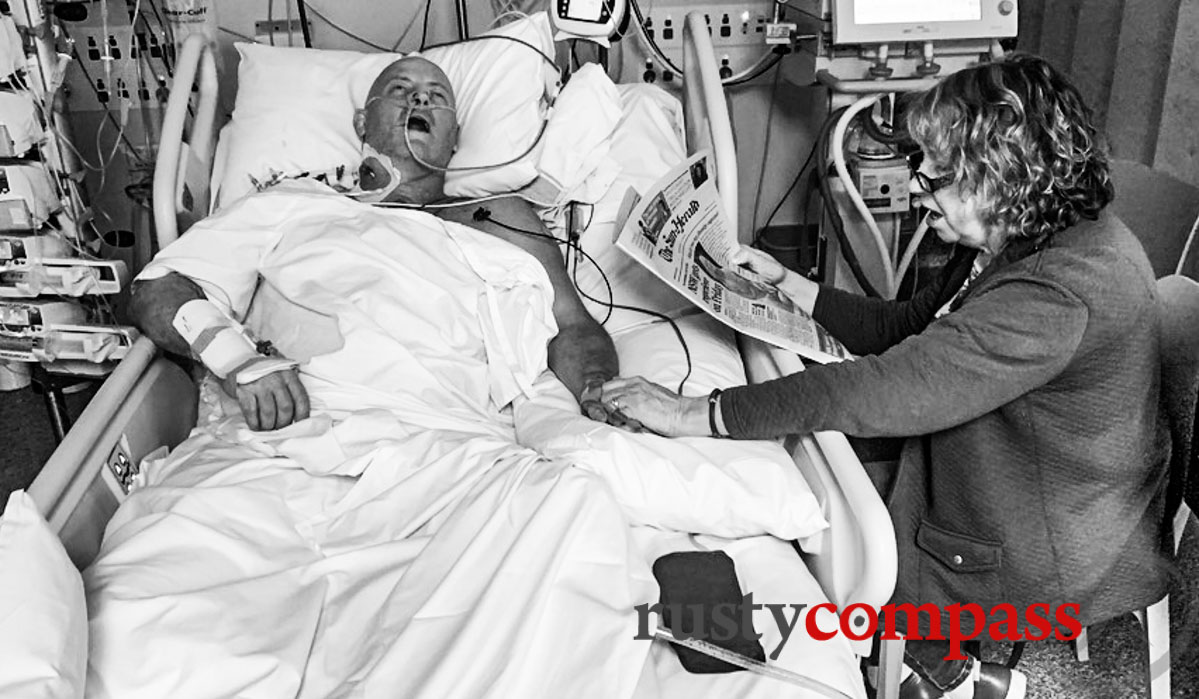
Photo: Joe Nash My sister reads me the paper and holds my hand
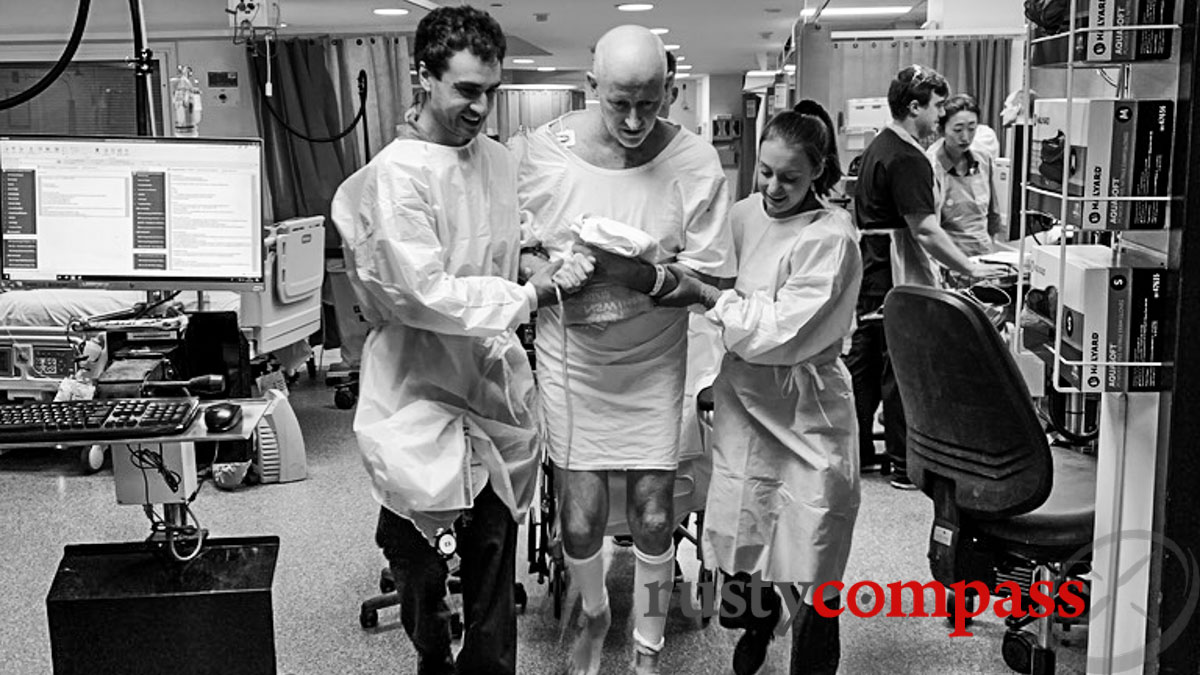
Photo: Joe Nash My first steps - walking again
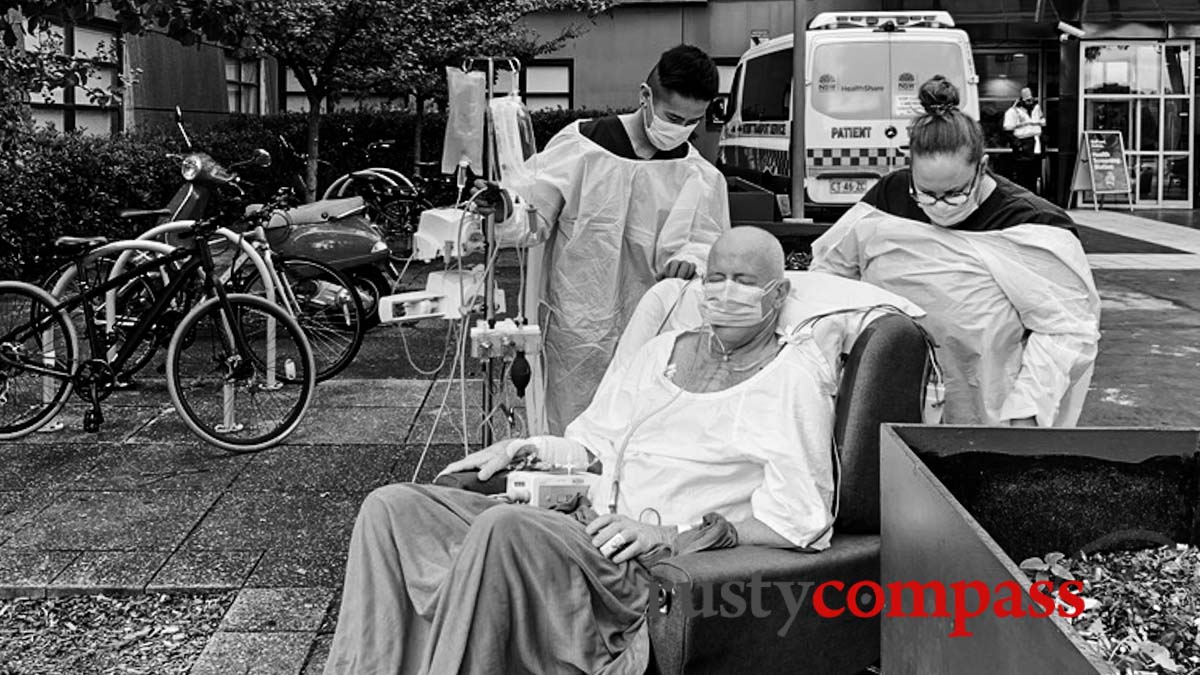
Photo: Joe Nash First rays of sunlight - RPA Sydney
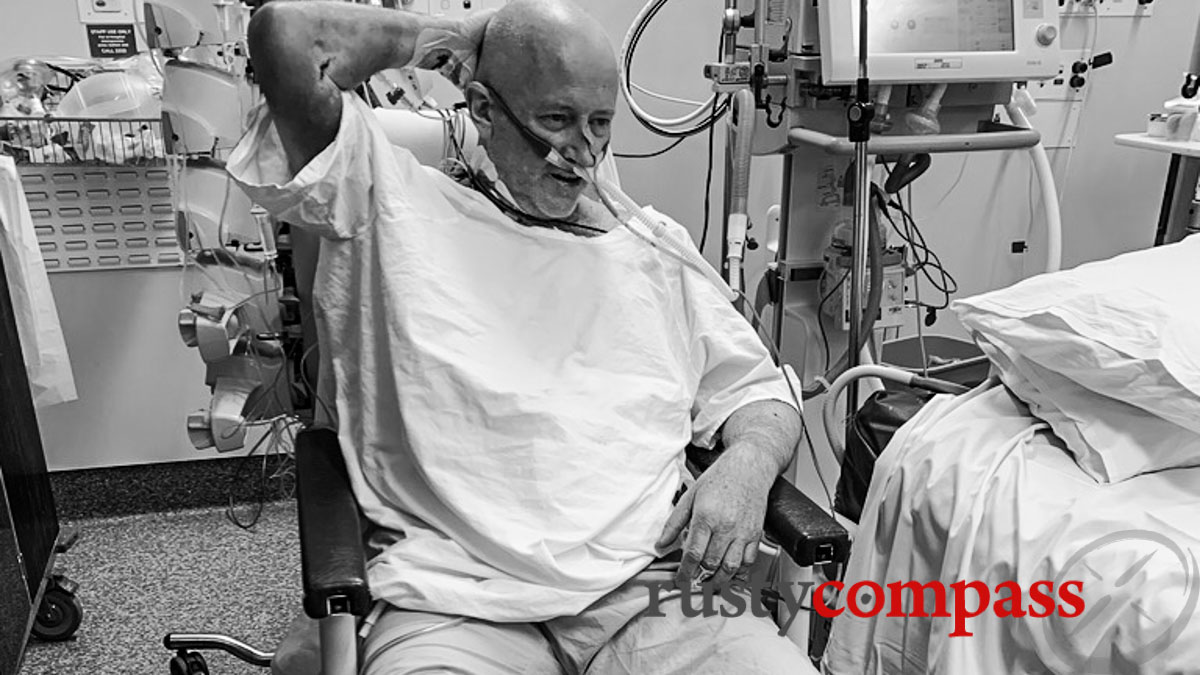
Photo: Joe Nash On the improve RPA Sydney
A few days out of ICU, and I was told I would need another operation. The second operation would reinforce what had already been done and increase my chances of a long and healthy life post-surgery. It ended up being another 10 hour marathon and complex. It knocked me about. I was on my feet the next day. But two major operations in a few weeks are a big drain on the body. I had a long recovery process ahead that I'm still coming out of now, months later.
I was dealing with my third major health issue in my 55 years (I've had cancer twice and I've ruptured my appendix - both were potentially fatal), but this was the big one. This time I knew I was close to the abyss. There was a connection between my illnesses. It seems most likely that radiation therapy I had on my neck in 1998 for lymphoma, had clipped my aortic arch, creating a weakness that finally gave way 22 years later.
The overwhelming sense I have as I begin to move on from this ordeal, is one of gratitude. I feel a tremendous sense of gratitude to the people of Royal Prince Alfred Hospital - from the surgeons who showed both exceptional skill, and patience for ensuring I understood what was happening to me, to the nurses, technicians, cleaners, porters who were also totally devoted to the cause of patient well-being. Dr Ben Robinson, the surgeon who saved my life on day one and then patiently tried to help understand my aorta through the haze of medication and sickness, was a superstar. I have spent a lot of time in recent months thinking about the lives of health professionals like Dr Robinson - the dedication, the stress and the incredible significance of the work they do. 2020 has made us all more aware of our health professionals and the work they do. They live in a culture completely at odds with the prevailing commercial culture most of us live in. We're very fortunate to have them and I was very fortunate to have Royal Prince Alfred just around the corner from me. In the video above I've suggested 2020 should be declared Year of the Health Care worker.
It wasn't only the skill and spirit of healthcare professionals that saved me though. The love and care of family and friends was also incredibly uplifting. As I mention in the video, one of the most vivid memories I have of the darkest days of sickness, intubation and misery, is the profound comfort I received from hand holding. It didn't matter who the hand belonged to. My brother and sister were most often by my side but the hands of friends and more than a few RPA Hospital nurses were also recruited to the task. It made an enormous difference and was truly life-giving. Hold the hands of the sick whenever you can - even if they're unconscious.
My new awareness of the super power of human touch for the ill makes the separation experienced by COVID sufferers in palliative care all the more tragic.
As the weeks go by and I feel stronger and stronger, the full drama of the aortic dissection becomes harder to reconcile with my current reality. Back then, a simple, fragile physical world dominated everything. My mouth was so dry and caked with gunk, I'm told I had to be restrained from tearing out my tubes. All I wanted was the taste of Coca Cola. I never drink Coke but I craved the intensity of the fizz. I had the same longing for fruit. But doctors worried I would choke. I finally got my Coke wish. One can was enough. There was also the immense relief of ice on my neck and head, and down my pants, during the worst days of fever. These basic needs become obsessions in times of serious illness. It's a simple life.
But experiencing the miracle of recovery for the third time has been profound. In 2000, I had an autologous stem cell transplant treating a recurrence of Hodgkins Lymphoma. That means I received my own stem cells back after intensive chemotherapy. I'll never forget the process of waiting for the bone marrow and immune system to recover from that. Likewise, I was a wreck, and crippled by pain after rupturing my appendix in 2014. The recovery was remarkable - over months. But neither can compare with what feels like a true miracle on this, third time round. It's a miracle aided by committed impressive humans. I thank them.
Nobody experiences serious ill-health without moments of self-pity. I've sure had mine. But there are always those doing it far worse. Any long stay in ICU reinforces that point. I've had a pretty messy 55 years when it comes to health issues. But I've received incredible love and care throughout. And I've lived to talk about my experiences. I am very very fortunate. I have a lot to be grateful for. And I can't wait to get back out on the road after the COVID storm passes. I hope you're doing OK, wherever you're reading this.

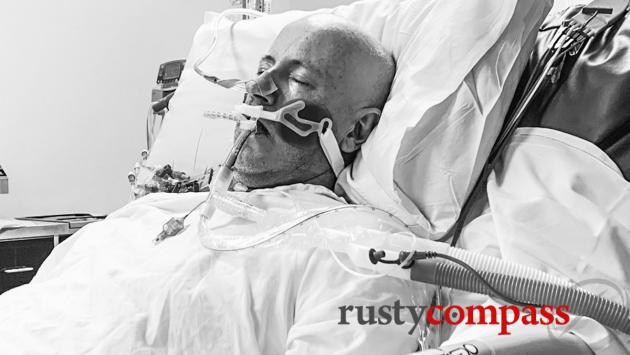



There are no comments yet.